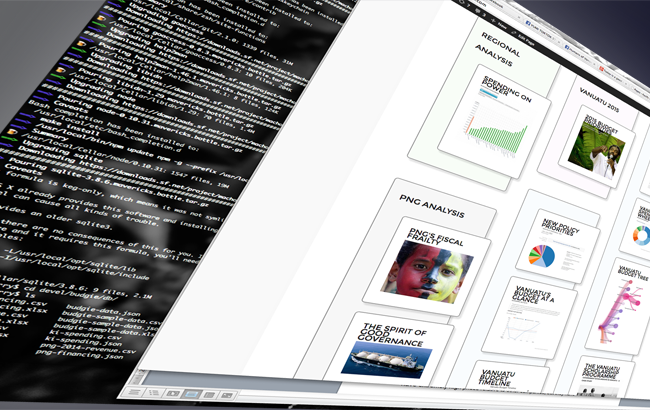
Data for development
As Alexander Pope famously said, a little knowledge is a dangerous thing. It seems to be all we have in the Pacific, though, and it is indeed dangerous.
Today, PiPP rolls out another visualisation on its Pacific Open Data website. Unlike some of our other data-driven undertakings recently, someone else did most of the heavy lifting. We are indebted to the Vanuatu Utilities Regulatory Authority for their ground-breaking work in obtaining and collating data concerning the average amount of money spent monthly on power. The Pacific Region Electricity Bills report is the result of significant work by URA researchers to provide the beginnings of a benchmark in measuring power consumption and its impact on development in the Pacific islands.
As facilitators of public policy dialogue, the most powerful tool we can bring to bear on any debate is understanding. But when even basic metrics such as the consumer price index or inflation are unknown or unreliable, how can we have a serious conversation about our financial state or our spending priorities?
Understanding the cost of living and doing business in Pacific island countries is a key component in building a fuller context for our development discussions. It is refreshing and encouraging to see that Vanuatu’s URA recognises this, and more to the point, that it has decided not to wait for someone else to commit the time and resources to getting the information. Most refreshing of all is their willingness to share the information in a useful and open way.
It’s a hard fact of life that administrators in the Pacific are invariably overburdened and under-resourced. Historically, they simply haven’t had the time, the equipment and, in many cases, the expertise to collate and maintain meaningful and useful statistics across the wide range of areas that we need. Developed countries generally have entire government departments devoted to such tasks. Likewise, there are often numerous civil society organisations devoted either wholly or in part to generating and disseminating information useful to the policy debate.
Not so in the Pacific.
As a result, we often find ourselves engaged in dialogue that leans more on rhetoric and emotion than reason. Passion, as Mr Pope also said, is the gale that all too often drives us across life’s vast ocean.
Of course, data alone does not suffice. The information contained within the URA’s consumer survey is best viewed as a starting point, not as destination in and of itself. Ultimately, an apples-to-apples comparison between power generation companies is not possible using only pricing information. As one observer rightly noted, UNELCO (primarily serving Port Vila, Vanuatu) may have extremely high prices relative to other companies, but they have consistently won awards for the quality and reliability of their service. The same can emphatically not be said of the power utility in Honiara, where prices are even higher.
We also note in our analysis that low costs often coincide with under-funding and a consequent lack of maintenance. Likewise, cross-subsidisation such as UNELCO’s which make rates for low levels of usage among the best in the Pacific have been shown to create perverse incentives against bringing power to the 87% of Vanuatu’s population that remain off the grid.
But these insights are much harder to come by in the absence of useful data.
Happily, the latest generation of web technologies –and the availability of internet itself– make it vastly easier to process, display and share public data. Work that used to take weeks now takes only hours. This brings a vast realm of information within the Pacific’s still-limited grasp. And sharing makes its impact greater. The technologies PiPP uses in Pacific Open Data, and the source data as well, are also available on request to anyone wishing to make further use of them.
It is noteworthy that, in spite of uptake on open data and open toolkits among global institutions (the World Bank’s Open Budgets initiative is arguably the most noteworthy), donors, governments and development partners in the Pacific are well behind the global trend. This is unnecessary as well as unfortunate. The low cost of entry implicit in so-called Web 2.0 technologies should be seen an opportunity to leapfrog past more time-consuming and frankly archaic means of gathering and processing data.
Some Pacific island governments are in the process of investing in automation and new technology, but a larger number are being held back by institutional weakness and a lack of motivation to improve efficiency and effectiveness. Likewise, development partners in the region have by and large failed to grasp the importance of mainstreaming data collection, management, and most importantly, data sharing in their projects, programmes and processes.
We are, collectively, on the back foot where data gathering and sharing is concerned. That has to change. And with the tools available to us now, it can.

